

William Godwin. Early life and education[edit] He then acted as a minister at Ware, Stowmarket and Beaconsfield.
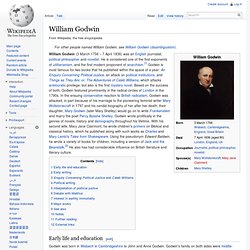
At Stowmarket the teachings of the French philosophers were brought before him by a friend, Joseph Fawcett, who held strong republican opinions. Godwin came to London in 1782, still nominally as a minister, to regenerate society with his pen — a real enthusiast, who shrank theoretically from no conclusions from the premises which he laid down. Political Justice. Title page from the third edition of Political Justice Enquiry Concerning Political Justice and its Influence on Morals and Happiness (1793) outlines the political philosophy of the 18th-century philosopher William Godwin.
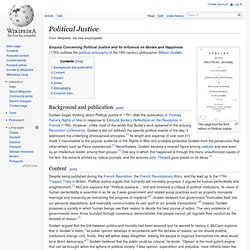
Background and publication[edit] Content[edit] Despite being published during the French Revolution, the French Revolutionary Wars, and the lead up to the 1794 Treason Trials in Britain, Political Justice argues that humanity will inevitably progress: it argues for human perfectibility and enlightenment.[1] McCann explains that "Political Justice is ... first and foremost a critique of political institutions. Its vision of human perfectibility is anarchist in so far as it sees government and related social practices such as property monopoly, marriage and monarchy as restraining the progress of mankind Godwin argued that the link between politics and morality had been severed and he wanted to restore it. Impact[edit] Utilitarianism. Utilitarianism is influential in political philosophy.
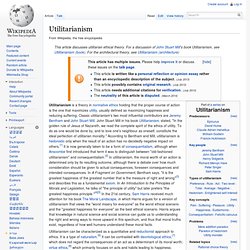
Bentham and Mill believed that a utilitarian government was achievable through democracy. Mill thought that despotism was also justifiable through utilitarianism as a transitional phase towards more democratic forms of governance. As an advocate of liberalism, Mill stressed the relationship between utilitarianism and individualism.[10] Historical background[edit] The importance of happiness as an end for humans has long been recognized.
Although utilitarianism is usually thought to start with Jeremy Bentham, there were earlier writers who presented theories that were strikingly similar. Hume says that all determinations of morality, this circumstance of public utility principally important. Henry Sidgwick. Henry Sidgwick (31 May 1838 – 28 August 1900) was an English utilitarian philosopher and economist.
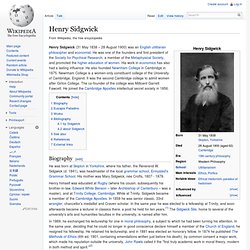
He was one of the founders and first president of the Society for Psychical Research, a member of the Metaphysical Society, and promoted the higher education of women. His work in economics has also had a lasting influence. He also founded Newnham College in Cambridge in 1875. Newnham College is a women-only constituent college of the University of Cambridge, England. It was the second Cambridge college to admit women after Girton College. Biography[edit] Jeremy Bentham. Jeremy Bentham (/ˈbɛnθəm/; 15 February [O.S. 4 February] 1748 – 6 June 1832) was a British philosopher, jurist, and social reformer.
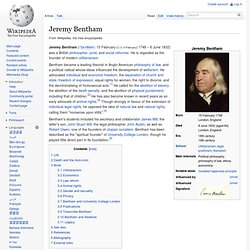
He is regarded as the founder of modern utilitarianism. Bentham became a leading theorist in Anglo-American philosophy of law, and a political radical whose ideas influenced the development of welfarism. Mary Wollstonecraft. Mary Wollstonecraft (/ˈwʊlstən.krɑːft/; 27 April 1759 – 10 September 1797) was an eighteenth-century English writer, philosopher, and advocate of women's rights.
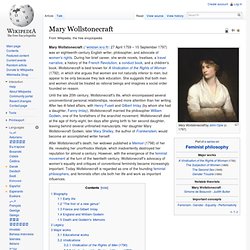
During her brief career, she wrote novels, treatises, a travel narrative, a history of the French Revolution, a conduct book, and a children's book. Wollstonecraft is best known for A Vindication of the Rights of Woman (1792), in which she argues that women are not naturally inferior to men, but appear to be only because they lack education. She suggests that both men and women should be treated as rational beings and imagines a social order founded on reason. Until the late 20th century, Wollstonecraft's life, which encompassed several unconventional personal relationships, received more attention than her writing. After two ill-fated affairs, with Henry Fuseli and Gilbert Imlay (by whom she had a daughter, Fanny Imlay), Wollstonecraft married the philosopher William Godwin, one of the forefathers of the anarchist movement.
Mary Shelley. Percy Bysshe Shelley. Percy Bysshe Shelley (/ˈpɜrsi ˈbɪʃ ˈʃɛli/;[2] 4 August 1792 – 8 July 1822) was one of the major English Romantic poets, and is regarded by some critics as amongst the finest lyric poets in the English language.
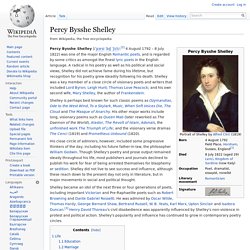
A radical in his poetry as well as his political and social views, Shelley did not achieve fame during his lifetime, but recognition for his poetry grew steadily following his death. Frankenstein. Frankenstein; or, The Modern Prometheus, is a novel written by English author Mary Shelley about eccentric scientist Victor Frankenstein, who creates a grotesque creature in an unorthodox scientific experiment.
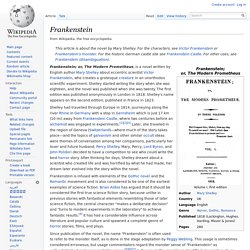
Shelley started writing the story when she was eighteen, and the novel was published when she was twenty. The first edition was published anonymously in London in 1818. Shelley's name appears on the second edition, published in France in 1823. Shelley had travelled through Europe in 1814, journeying along the river Rhine in Germany with a stop in Gernsheim which is just 17 km (10 mi) away from Frankenstein Castle, where two centuries before an alchemist was engaged in experiments.[1][2][3] Later, she traveled in the region of Geneva (Switzerland)—where much of the story takes place—and the topics of galvanism and other similar occult ideas were themes of conversation among her companions, particularly her lover and future husband, Percy Shelley.